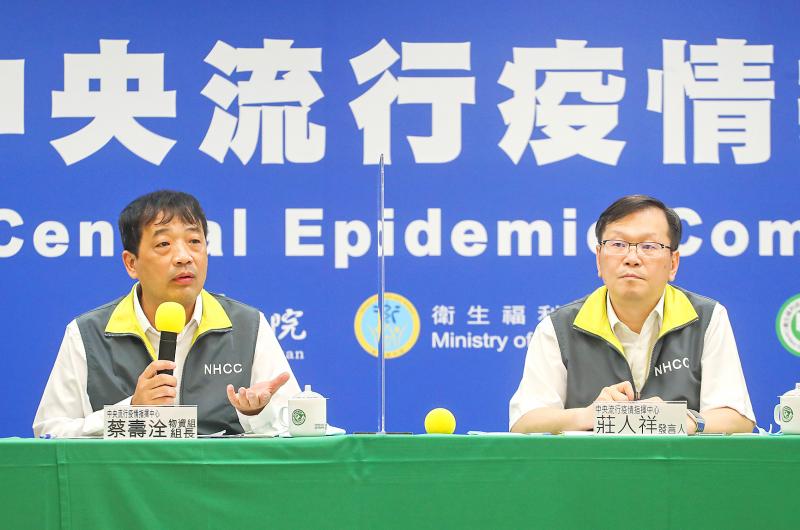The Central Epidemic Command Center (CECC) yesterday confirmed that more than 830,000 nonmedical-grade masks were seized at customs for being falsely labeled as being made in Taiwan.
Tsai Shou-chuan (蔡壽洤), head of the center’s supply division, said that customs conducted batch-by-batch inspections on imported masks from Aug. 10 to Friday, and 577 batches of nonmedical-grade masks — a total of about 838,320 masks — were seized for false labeling.
The Bureau of Foreign Trade would fine those responsible, while prosecutors would investigate and decide whether the masks should be returned or destroyed, he said.

Photo: CNA
The seizure comes after the owner of New Taipei City-based mask supplier Carry Hi-tech Co (加利科技) was last week accused of importing more than 3 million nonmedical-grade masks from China and selling them through the government’s mask rationing system as medical masks made in Taiwan.
Asked if importers of the seized masks included local mask suppliers of medical masks for the government’s mask rationing system, Tsai said they did, and that an investigation report would be released in two weeks.
However, the center later said that his response was “a slip of the tongue,” and that the center has not yet confirmed whether suppliers for the government’s mask rationing system were involved.
As for people who bought masks with the “Carry mask” logo imprinted on them, the case is being investigated by the Shilin District Prosecutors’ Office.
The center had announced that people who had bought Carry Hi-tech masks through the rationing system could exchange them at pharmacies from Friday.
Tsai yesterday said that more than 530,000 Carry Hi-tech masks were exchanged on Friday and another 743,202 were exchanged on Saturday, bringing the total number of recalled Carry Hi-tech masks to 1,279,177 in the first two days.
More than 1.19 million Carry Hi-tech masks, or 90 percent, were recalled in New Taipei City, he added.
Meanwhile, the center yesterday reported an imported case of COVID-19 — a Taiwanese man who had returned from the Philippines.
The man, who is in his 40s, works and lives in the Philippines, and returned to Taiwan alone on Thursday, center spokesman Chuang Jen-hsiang (莊人祥) said.
The man began experiencing a fever, sore throat, coughing, shortness of breath, chest tightness and sore muscles on Tuesday last week, but did not seek medical attention, he said.
Chuang said the man reported that a Filipino friend who lives with him had tested positive for COVID-19 on Thursday.
The man had informed the airline personnel about his condition before boarding the plane, and wore a mask and protective clothing throughout the flight, he said, adding that his first test result taken at the airport came back negative.
As the man continued to experience shortness of breath and chest tightness during his stay at a centralized quarantine facility, he was tested again and the test came back positive yesterday, making him the nation’s 493rd confirmed case, Chuang said.

DAREDEVIL: Honnold said it had always been a dream of his to climb Taipei 101, while a Netflix producer said the skyscraper was ‘a real icon of this country’ US climber Alex Honnold yesterday took on Taiwan’s tallest building, becoming the first person to scale Taipei 101 without a rope, harness or safety net. Hundreds of spectators gathered at the base of the 101-story skyscraper to watch Honnold, 40, embark on his daredevil feat, which was also broadcast live on Netflix. Dressed in a red T-shirt and yellow custom-made climbing shoes, Honnold swiftly moved up the southeast face of the glass and steel building. At one point, he stepped onto a platform midway up to wave down at fans and onlookers who were taking photos. People watching from inside

A Vietnamese migrant worker yesterday won NT$12 million (US$379,627) on a Lunar New Year scratch card in Kaohsiung as part of Taiwan Lottery Co’s (台灣彩券) “NT$12 Million Grand Fortune” (1200萬大吉利) game. The man was the first top-prize winner of the new game launched on Jan. 6 to mark the Lunar New Year. Three Vietnamese migrant workers visited a Taiwan Lottery shop on Xinyue Street in Kaohsiung’s Gangshan District (崗山), a store representative said. The player bought multiple tickets and, after winning nothing, held the final lottery ticket in one hand and rubbed the store’s statue of the Maitreya Buddha’s belly with the other,

Japan’s strategic alliance with the US would collapse if Tokyo were to turn away from a conflict in Taiwan, Japanese Prime Minister Sanae Takaichi said yesterday, but distanced herself from previous comments that suggested a possible military response in such an event. Takaichi expressed her latest views on a nationally broadcast TV program late on Monday, where an opposition party leader criticized her for igniting tensions with China with the earlier remarks. Ties between Japan and China have sunk to the worst level in years after Takaichi said in November that a hypothetical Chinese attack on Taiwan could bring about a Japanese

‘COMMITTED TO DETERRENCE’: Washington would stand by its allies, but it can only help as much as countries help themselves, Raymond Greene said The US is committed to deterrence in the first island chain, but it should not bear the burden alone, as “freedom is not free,” American Institute in Taiwan Director Raymond Greene said in a speech at the Institute for National Defense and Security Research’s “Strengthening Resilience: Defense as the Engine of Development” seminar in Taipei yesterday. In the speech, titled “Investing Together and a Secure and Prosperous Future,” Greene highlighted the contributions of US President Donald Trump’s administration to Taiwan’s defense efforts, including the establishment of supply chains for drones and autonomous systems, offers of security assistance and the expansion of